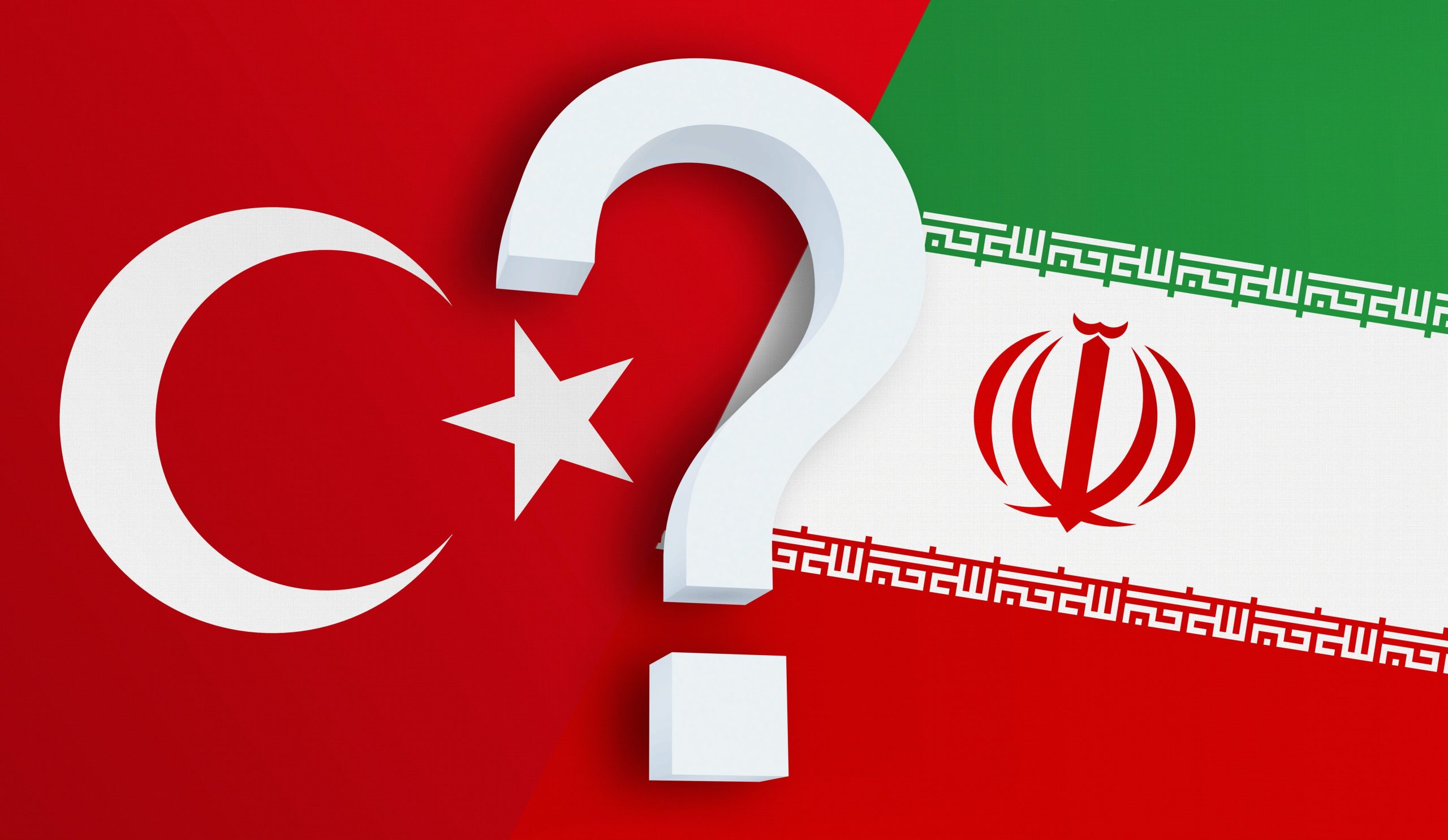Disagreements have recently escalated between Turkey and Iran over Turkish policy toward Azerbaijan, following the military maneuvers that Turkey, Pakistan, and Azerbaijan conducted in the Caspian Sea on September 12th. Iran responded, on October 1st, by conducting maneuvers near the border with Azerbaijan. Questions have now arisen regarding the impact of these tensions on Arab issues in which both Iran and Turkey are engaged, and on which they have recently reached understandings born of necessity, such as Syria and Kurdish aspirations to establish an independent state. Moreover, economic related issues also link the two countries together.
Escalating Disparities
The Turkish military intervention in support of Azerbaijan in its conflict with Armenia in 2020 has created a new dimension to Turkish-Iranian relations. Azerbaijan succeeded in exerting its control over many areas in the Nagorno-Karabakh region, while Tehran viewed Turkish presence near its borders with apprehension. Tehran did not hide its discontent with this Turkish policy. The first open clash between the two countries came on December 11, 2020, when Tehran objected to a poem talking about the division of Azerbaijan’s land between Russia and Iran in the nineteenth century, recited by Turkish President Recep Tayyip Erdogan during his visit to Azerbaijan. The Iranian Foreign Ministry summoned the Turkish ambassador to Tehran to protest the poem and considered it “interference” in its internal affairs. The Ministry of Foreign Affairs said on its website: “The Turkish ambassador informed us that the era of territorial claims and expansionist empires is over. Iran will not allow anyone to interfere with its territorial integrity.”
Despite the two sides’ efforts to alleviate the crisis, the Azerbaijani-Armenian conflict remained an issue of contention between Ankara and Tehran. especially with the recent military moves in the region. When, on September 12, 2021, Turkey, Azerbaijan, and Pakistan held military exercises in the Caspian Sea under the name the “Three Brothers”, Tehran, according to the Foreign Ministry’s spokesman Saeed Khatibzadeh, considered the maneuvers a threat to its national security.
In response, on the first of October, Tehran conducted military maneuvers, “Fateh Khyber”, with the participation of the Armenian armed forces on the border with Azerbaijan. The maneuvers were criticized by Azerbaijani President Ilham Aliyev. Days after these maneuvers, on October 5th, it was announced that military maneuvers between the Turkish and Azeri armies would begin in the Azeri “Nahjivan” region. These tensions between Turkey and Iran over Azerbaijan could develop along two different scenarios regarding the future of Tehran and Ankara’s policies in the Middle East, one which involves cooperation and the other leads to open confrontation.
Scenario1: coordination
The first scenario for relations between the two countries involves the continuation of bilateral coordination, which is the most likely scenario in the near term at least. It is likely that Iran and Turkey will continue their pragmatic coordination regarding to Middle Eastern issues, separating them from tensions regarding Azerbaijan. It is unlikely this scenario will lead to an alliance between the two countries, rather the “cooperation-competition” formula will continue to be the model for relations between the two parties, driven by a wide range of factors, including:
1- Significant economic interests: Economic interests are an important dimension in Turkish-Iranian relations, helping in some way to smooth differences between them. While economic relation was greatly affected after the withdrawal of the United States of America from the nuclear agreement, they remain important, especially Turkey’s interest in Iranian gas, and oil. Iran is also an essential and significant market for Turkish goods, and an important entryway for these goods into Central Asian markets. Iranian investments are also significant, as it is estimated that the Iranians come in second place in buying real estate in Turkey. The importance of the economic dimension in the relations between the two countries has recently become evident when Iranian customs spokesman Ruhollah Latifi announced on the 1st of October 2021 the activation of the Istanbul – Tehran – Islamabad economic corridor, launched by the passage of two trucks carrying fabric and rubber, from the Pakistani city of Karachi to Istanbul via Iran as a trial run.
2- De-escalation of tensions: In this scenario, Turkey and Iran are likely to seek to de-escalate the tensions between them regarding Azerbaijan , to prevent a spillover to their other Middle East issues. Perhaps this explains the timing of the political consultations session that took place on October 8 in Ankara between the two sides, headed by the Turkish Deputy Foreign Ministers, Sadat Unal, and the Iranian Ali Bagheri Kani. According to the Turkish Foreign Ministry, the consultation sessions witnessed the two sides exchanging views on a number of regional and international issues, most notably: Syria, Afghanistan, Yemen, and the Caucasus region.
Perhaps the perception of the two countries’ leaders regarding the importance of these bilateral ties will act as a catalyst for easing tensions. In a phone call that took place between Iranian President Ibrahim Raisi and Turkish President Recep Tayyip Erdogan, on the 12th of August 2021, Raisi stated that “Iranian-Turkish cooperation is necessary to ensure security and stability in the region.” The Turkish president also stressed that Iranian-Turkish relations will develop during the coming period.
3- Countering repercussions from the Afghan crisis: Cooperation on Afghanistan is important to both countries, and thus may push them to postpone disagreements and continue pragmatic cooperation on regional issues. Perhaps this was indicated by the Speaker of the Turkish Parliament, Mustafa Shantop, during his meeting on the 5th of August 2021, with his Iranian counterpart, Mohammad Baqer Qalibaf in Tehran, where he mentioned that Turkey and Iran are the two countries most affected by the migration crisis in Afghanistan, adding: “Cooperation must be increased to ensure stability and stop the migration wave from this country.” In addition to the issue of immigration and its effects, the two countries need to coordinate between them on various other issues regarding Afghanistan. Due to its geographic proximity, Iran views developments in Afghanistan with concern, as they directly reflect on its own security and interests. Turkey, on its part, has expressed an interest in strengthening its influence inside Afghanistan and consolidating relations with the “Taliban”. This has led Tehran to communicate with Ankara on this issue, both to ascertain Turkish motives, and to identify what are from Tehran’s point of view, red lines that Turkey should not breach.
4- Dealing with the Kurdish issue: Despite the apparent initial differences between Tehran and Ankara in their handling of the Syrian conflict, with Tehran intervening to support the Assad regime, while Ankara aimed to overthrow it by supporting the opposition, the conflict imposed a kind of understanding between the two countries over time, especially with the shift in priorities of Turkish policy in Syria. It has become clear that Turkey has failed in its efforts to overthrow the Assad regime. The result was the emergence of the tripartite Astana track, which contributed to the expansion of coordination between Russia, Turkey, and Iran regarding developments in Syria. In this context, the Kurdish issue became a priority for Ankara, as the political ambitions of Kurdish nationalism pushed Turkey and Iran to continue their cooperation in both Iraq and Syria, in the context of their common fear of the impact of the Kurdish project on their respective internal stability. Accordingly, Turkey considered establishing closer relations with Iran and Russia against the PKK factions in Syria as an important and basic entry point, to prevent the formation an independent state. In the same vein, Turkey and Iran also announced their rejection of the Kurdistan Regional Government’s referendum on independence in 2017.
5- Convergence on the nuclear issue: Ankara has adopted a positive position, from Tehran’s point of view, on the nuclear issue. Turkey rejected the US withdrawal from the nuclear agreement and opposed the imposition of US sanctions on Iran. Ankara views the nuclear agreement as a tool to achieve stability in the region and prevent Tehran from developing nuclear weapons. It is unlikely that this situation will be impacted, at least in the short-term, by Iranian-Turkish tensions over Azerbaijan, especially since reaching a nuclear agreement with Iran could serve Turkish interests, including on the economic front.
Scenario2: conflict
The second scenario threatens open conflict between the two countries, with Turkish-Iranian differences in Azerbaijan having a wide-ranging impact on their stances regarding various Middle East issues. According to this scenario, open conflict could erupt between Ankara and Tehran as their pragmatic understandings on various issues declines. This scenario is based on a number of factors, foremost of which is the historical dimension and legacy of mistrust, in which ideological differences between the two countries since the time of the Ottoman Empire and the Persian Empire also overlap.
Moreover, current regional and international developments may also have a negative impact on the understanding reached between the two countries in the region. The arrival of US President Joe Biden to the White House, the easing of US-Turkish tensions, and the decline in Turkish fears of Washington’s efforts to establish a new regional order which sidelines Turkey, could reduce Ankara’s desire to bridge its differences with Iran.
Shifts in Turkish regional policies may also reduce Turkish-Irani cooperation, especially as Turkey is opening new channels of communication with major regional powers, to overcome the hostility generated by Turkish policies in the past years. Moreover, changes in the status of the Syrian conflict, and increasing Arab openness to the Assad regime, which aims to mitigate Iranian influence and influence in Syria, may also provide Ankara with new incentives to escalate its criticism of Iranian policy and its network of proxies in the region.
While this scenario of open conflict between Turkey and Iran is possible in light of regional and international changes, it is not likely to happen in the near term, especially since the aforementioned variables are still in the preliminary stages and their final outcomes remain unclear. Therefore, the scenario of continuing coordination is most likely in the near term, as the two countries will maintain spaces for pragmatic cooperation on some issues, in parallel with competition on others, such as Azerbaijan.


